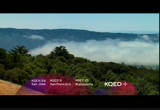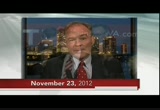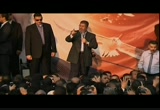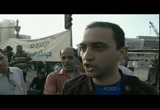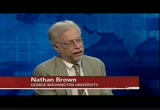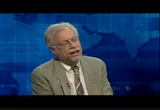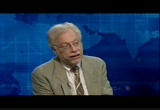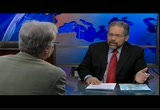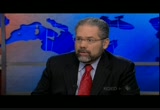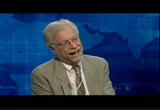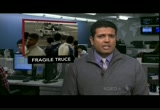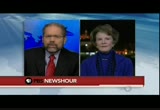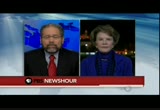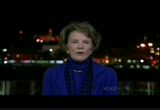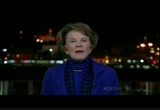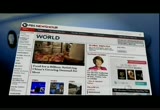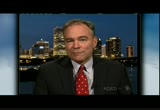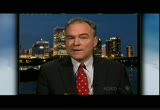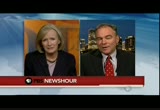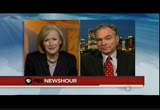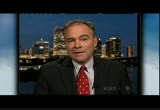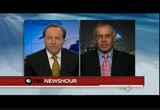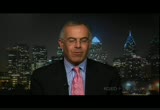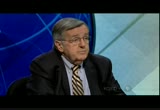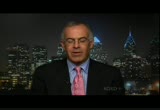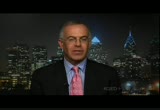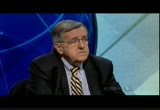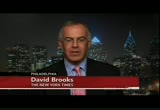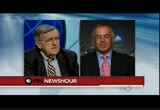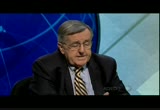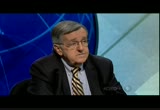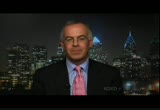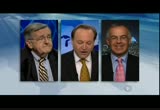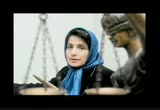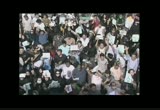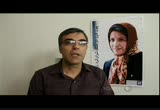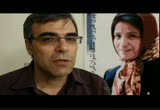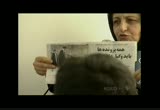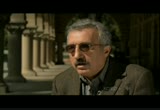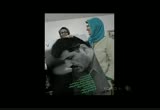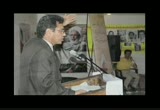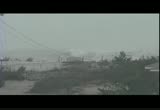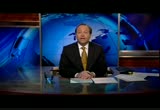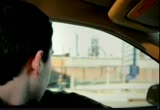tv PBS News Hour PBS November 24, 2012 12:00am-1:00am PST
12:00 am
captioning sponsored by macneil/lehrer productions >> brown: police and protesters clashed in cairo's tahrir square and elsewhere in egypt today, sparked when president mohamed morsi granted himself broad new powers. good evening. i'm jeffrey brown. >> suarez: and i'm ray suarez. on the newshour tonight, we have the latest on the widespread demonstrations, and assess what's behind the egyptian leader's moves. >> brown: then, the death toll in syria's 20-month war has climbed past 40,000, according to a human rights group. we get an update from margaret warner, reporting from the turkish border. >> suarez: we continue our conversations with newly-elected senators.
12:01 am
judy woodruff talks with virginia democrat tim kaine. >> i intend to hit the ground on january 3 very much running. > running. we can make progress quickly if we listen to each other and find those points of common ground they think do exist. >> brown: mark shields and david brooks analyze the weeks news. >> suarez: spencer michels has the story of a growing crackdown on dissidents and journalists in iran. >> brown: and we close with poet jennifer fitzgerald on hurricane sandy's destructive path through her home town of staten island. that's all ahead on tonight's newshour. >> major funding for the pbs newshour has been provided by: ♪ ♪ ♪
12:02 am
moving our economy for 160 ♪ ♪ moving our economy for 160 years. bnsf, the engine that connects us. >> and by the bill and melinda gates foundation. dedicated to the idea that all people deserve the chance to live a healthy productive life. >> and with the ongoing support of these institutions and foundations. and... >> this program was made possible by the corporation for public broadcasting. and by contributions to your pbs station from viewers like you. thank you. >> brown: demonstrations, clashes with the police, and
12:03 am
tear gas in tahrir square-- familiar scenes in egypt nearly two years ago that led to the fall of longtime leader hosni mubark. but today, they were aimed at egypt's new leader. in the coastal city of alexandria, opponents set fire to the offices of president mohammed morsi's political party, the muslim brotherhood. there and elsewhere in egypt today, the president's critics and supporters clashed in the streets over his decree yesterday exempting himself from judicial review, and giving him authority to take steps against "threats to the revolution." morsi, egypt's first freely elected president, took office in june. in recent days, he'd garnered worldwide praise for mediating a cease-fire between israel and hamas. today, he told a supportive crowd outside the presidential palace in cairo that granting himself sweeping powers was necessary to prevent figures from the old regime from halting progress.
12:04 am
>> ( translated ): i haven't taken a decision to use it against anyone-- to go against anyone is something that i could never be associated with-- or announcing that i am biased towards anyone. however, i must put myself on a clear path that will lead to the achievement of a clear goal. >> brown: the president's backers insisted the decree would be in effect only until a new constitution is approved. >> ( translated ): yes, he might be a dictator for the time being or might have unprecedented power throughout this period of two months, but after that, these powers will be transferred to an elected parliament. >> brown: but tens of thousands of anti-morsi protesters rallied in tahrir square, the heart of last year's popular revolution that led to end of the regime of hosni mubarak. they threw rocks at riot police, who retaliated by firing tear gas canisters to disperse the crowds. >> this is just a new era of dictatorship in egypt. this is not what the revolution was about. the revolution was about stripping the president from all
12:05 am
of these unquestioned rights. and now, we are a step back than where we were before. >> brown: among the protestors in cairo were two men who ran against mr. morsi-- hamdin sabbahi from the leftist al- karamah party, and constitution party founder mohamed el- baradei, who tweeted yesterday that morsi had appointed himself "a new pharaoh." in his decree, morsi also held out the possibility of a second trial for hosni mubarek for the killings of protestors. >> suarez: to explain why morsi took these steps and the reaction that followed, i'm joined by nathan brown, an expert on egyptian constitutional law and politics. he's a professor at george washington university. do you find it significant that this wasn't just tahrir square but alexandria, port said. >> oh, yes. essentially most of the
12:06 am
non-islammist political forces in egypt-- that is the brotherhood and others aside-- have lined up against us. the real question is are they going to be able to form a united front? and do they have any strategy by which to overturn morsi's decisions. >> suarez: what exactly has he done through these decrees? what did he say-- what powers did he give to himself, basically, until there's a constitution? >> well, he did a lot of little things. he dismissed the old prosecutor, seen as a hold-over from the old rejewel. he promised new trials. but the main thing that he did was to take all of his actions, and place them outside of court review. and he also made impossible to disband the constitutional assembly that is now writing the document. he had already assumed not simply presidential powers but legislative powers. that he did in august.
12:07 am
what he is doing right now what, he did yesterday, was to place all of his actions, and those of the constitutional assembly beyond the reach of the judiciary as well. >> suarez: now, we heard the reaction from the streets of egypt. president morsi in his own defense says, "hey, actually, i'm defending the revolution because there's been so much obstruction that i need these powers just to run the country until there's a new constitution in place." plausible argument? >> it's a plausible argument, but i think for the transition it's a dangerous one. essentially, what you have is the transition process that's worked in a very bad fashion since the beginning hasn't produce aid consensus. it has 100 people who are supposed to be writing the constitution and it's dominated by islamist. the non-islammistes were threatening to walk out, not cooperating. so what morsi did yesterday was to say, okay, you can't challenge that process. and i think instead of making it
12:08 am
so those people come back to the assembly and really buckle down and write a consensus document what, it's going to do is harden positions, so those people who are outside of the process, those people who are a minority in the constitutional assembly are just going to pull out of it entirely, and the whole process is going to be essentially if the constitution, and writing a constitution and shoving it down the opposition's throats. >morsi's defense would be this is only temporary. as soon as the constitution is written, then my powers go back to whatever that document says. i'm not going to do this endlessly. mubarak kept on declaring a state of emergency and extending it and extending it and so on. i'm not trying to do that. just give me till february so they can basically oversee this process, and then we go back to normal. >> suarez: you know, it's only about 48 hours since the this
12:09 am
guy was the toast of world capitals for role he took in bringing about a cease-fire between israel and gaza. cothese things move on separate traction or did he feel his hand strengthened by that new attention? >> we have to speculate about motives here, but i cannot believe it's a total coincidence. morse all along has been trying to assert his authority and feeling that he's it constrained in all kinds of different ways, and he's really tried to find the right time to make these moves. right now, i think he felt that the constitutional assembly was moving towards completion. there was a sense of crisis coming if this document couldn't get written. and he had an international maneuver. the united states is not going to take a very strong line against him right after he proved so useful. i think, again, it is speculation. but through the got to be some deliberate attempt to use the current international atmosphere to move forward domestically. >> suarez: it's early days yet to have the square filled once
12:10 am
again after the eyes of the world had been on the downfall of the last egyptian leader. does morsi still have the upper hand at this point? >> i think he does have the upper hand, but my guess is he underestimated the popular reaction. what he had done in his moves yesterday was to pepper his decrees with all kinds of carrots for different groups of the opposition, hoping he would be able to split them. that hasn't happened so far. what the opposition really has to do, now that they've basically unified against thee decrees is find some way of challenging. are they going to move to the streets with demonstrations? how many people can they get. are they going to go to the court who says you can't do this and have morsi say yes, have, and have a constitutional showdown. >> suarez: might this have put pressure in the pipe to get a settlement on a constitution and a new parliament sooner rather
12:11 am
than later? >> i think if you take a look at the actual constitution that they're writing, then you don't see a document that is all that problematic. some of the opposition and members of the assembly will have some clauses that bother them. it's probably not the constitution everybody was dreaming about but it still is a workable document. the problem is if you go in, even with the workable document, where there is this much distrust and bitterness and people are convinced the elections are not going to be fair, they have to take their battles into the streets, then you're not going to a stable ligmillsystem that comes out of this. >> suarez: professor nathan brown, thanks for joining us. >> thank you. >> brown: we have a slideshow of images from egypt on our web site. and still to come on the newshour: syria's widening war; senator-elect tim kaine; shields and brooks; pressure on human rights advocates in iran; and storm damage through the eyes of a poet. but first, the other news of the day. here's hari sreenivasan.
12:12 am
>> sreenivasan: israeli troops tested a fragile truce with hamas today and opened fire on the gaza border, killing a palestinian man. 19 others were wounded. palestinians gathered along the border after the shooting. they confronted israeli troops on the other side of the fence, who ordered them to leave. israel and hamas agreed to the cease-fire on wednesday, after more than a week of intense fighting that claimed the lives of 172 people, mostly palestinians. the so-called "black friday" shopping frenzy in the u.s. began in earnest today, and in some cases, it got started last night, before thanksgiving was even over. some shoppers had been searching for bargains all night long. >> we started at about 10:00 p.m., and we've been going ever since. >> we go like out, like, 12:00 a.m. or 1:00 a.m. and really save a lot of money. >> sreenivasan: others were simply following a holiday tradition. >> i didn't come crazy early when it was mobbed, so i don't necessarily get the best deal on everything, but it's just getting out and seeing everybody and having fun. >> sreenivasan: across the
12:13 am
country, many began their holiday shopping late thursday evening, as big box stores like target, walmart and toys "r" us opened hours before midnight, blurring the line between black friday and thanksgiving day. >> it's almost been like an arms race. first, it was 8:00, then 7:00, then 6:00, then 4:00 in the morning, then midnight. but we have to be responsive to the competitive environment. >> sreenivasan: retailers rely on november and december sales, which by themselves can account for more than a third of their annual revenues, and 40% to 50% percent of their yearly profits. >> this morning, we had lines that went all the way down to marshall's. the parking lot was full. it was great. a lot of people came in really excited. >> sreenivasan: those long lines mean the expectation of 4% growth by the national federation of retailers may come true. one retailer faced a backlash from workers today with picket lines forming outside walmart stores from california to maryland. a group called our walmart organized the walk-off in 100 cities.
12:14 am
>> we're asking for living wages, we're asking for decent scheduling. they're not things that are hard. i mean, we want health care. they're the most richest retailer in the world. >> sreenivasan: walmart executives said these protestors do not represent the 1.3 million employees who work at the company. >> sreenivasan: the stock market also got a boost from black friday, rising sharply on early reports of strong retail sales. on a shortened day of trading, the dow jones industrial average gained more than 172 points to close at 13,009. the nasdaq rose 40 points to close above 2,966. for the week, the dow gained 3.4%; the nasdaq rose nearly 4%. a european union summit in brussels broke up today without any agreement on a long-term budget. the 27-nation bloc was trying to reach consensus on a more than trillion-dollar long-term spending plan. it primarily funds farming and programs to spur growth in less- developed nations. some members backed a budget with cuts, others pushed for greater spending to kick-start recession-hit economies.
12:15 am
there is no set deadline for a deal. a silver sixpence coin from colonial massachusetts has been auctioned off for $430,000 in baltimore. that's four times what it was expected to get. the coin dates to 1652 and is one of only eight known to exist in the world. it was first unearthed in a potato field in east hampton, new york in 1990 by a woman using a metal detector. those are some of the day's major stories. now, back to ray. >> suarez: and we turn to syria. no country has been more affected by the uprising than its neighbor to the north, turkey. thousands of refugees have flooded across the border, and stray mortar shells routinely land near turkish towns. margaret warner is on a reporting trip to the region. i spoke with her from istanbul a short time ago about turkey's role in the conflict and its relationship with the u.s. margaret, welcome. the death toll is passed a significant milestone-- 40,000 people-- and the war is said to
12:16 am
be widening. what's changing inside syria and how is that affecting turkey? >> warner: well, what's clear, ray, is what isn't change is the loss of life. we saw that in northwestern syria where assad's ground forces had withdrawn but the reulentless bombing from the air continued. so people were still dying there. then as we have moved eastward in turkey, on the turkish side of the border, it's apparent that the violence in syria, the fighting is also moving eastward, too. and the new wrinkle here is that in some areas from which the government forces have withdrawn, there's now a new battle front between the kurds, who have taken control of some of these towns; and the free syrian army it's rebels -- who are otherwise winning territory in other parts of syria. so, actually, as you you said, the conflict is widening. there are more players, and of course that will only bring more loss of life. >> suarez: the kurds,sh, a
12:17 am
transnational people, living in turkey, in iraq, and in syria. but i thought the old idea was the enemy of my enemy is my friend. how come the free stir croon forces are fighting against the kurds? >> warner: well, that old adannual doesn't arb ply to syria's kurds. syria's kurds have been so marginalized, perhaps the most in any of-- there are actually four countries, because iran also has kurds. they weren't even citizens of syria. and they don't trust, the free syrian army, the sunni arab rebels-- they don't have a bond with them and they don't trust them any more than they did assad. they don't trust in a post-assad syria, if it was completely run by the rebeles, the rebels we know of, that they would have any more rights than they did under assad. so instead they've been training over in camps in iraqi kurdistan, and hoping to take advantage of this chaos to carve out areas that could ultimately
12:18 am
become an independent syrian kurdish state. >> suarez: in the meantime, as syria's war widens, the pressure on turkey has grown as we've seen from your previous reporting here on the newshour. but recently, the ankara government has made an interesting request to nato. tell us more about it. >> warner: you're absolutely right, ray, turkey has requested-- actually a week or so ago-- for nato to send patriot missile batteries to defend turkey's border and airspace against any incoming of any sort that could wowld come in from syria and elsewhere. it's no secret the turkish prime minister and assad have been on the outs since assad was called on to step down. as you know, turkish forces have been moved to the border. there has been some back-and-forth. it has become very apparent and
12:19 am
widely discussed in the media here, despite having the second largest army in nato after the u.s., turkey's air defenses are not that great. what turkey is saying to nato we need to defend our airspace. there is, however, speculation that it might also be turkey's backdoor way of putting in a cornerstone from which nato ultimately might create a no-fly zone inside syria. and that is something turkey has been calling for, for months now, because they want to create a zone in which internally displaced in syria can be safe without conclude of coming into turkey. turkey is already paying a huge price and a huge burden for 120,000 jufs refugees and camps that they have there, and they're really getting to the breaking point on that. >> suarez: margaret warnener istanbul, thanks for joining us. >> brown: margaret's next report
12:20 am
delves further into the fighting by the kurds in syria and its political impact on turkey. plus, you can see her earlier stories and blog posts on our "world" page. >> suarez: and now we continue our conversations with newly elected members of the u.s. senate. tim kaine is a former virginia governor, lieutenant governor, and mayor of richmond. the 54-year old kaine also led the democratic national committee. he won 53% of the vote to defeat republican george allen, and replaces retiring democrat jim webb. judy woodruff talked with him earlier this week. >> woodruff: senator-elect tim kaine, congratulations. >> judy, it's great to be with you. thank so much. . >> woodruff: yours was not only one the closest senate flatsz country. i believe it was the most expensive senate race in the country, over $80 million spent. what does that say about our democracy? >> well, it was very unfortunate.
12:21 am
the kind of negative ads that were run against me for a year from a variety of these outside groups did not impress virginia voters. they just said, look, if you want to get electd to the senate, you're going to have to tell us why you want to go there and what you're going to do. >> woodruff: you took an unusual approach, i think, tour your campaign. you went around the state of virginia and talked to people in the other party who you knew were not going to support you and you said, "whatever hams, if i win, i want to work with you." is that an approach you think you can use in washington? >> well, i'm going to use it. we'll see if it's successful. you know, i was at least a 50-50 chance of winning this race. i had run seven races before this and hadn't lost one. i wanted to let people know even if they were on the other side i intended to win and i was going to win and try to work together for the good of the commonwealth and the country. we had an orientation last week in washington, 12 new senators, and we're democrats and runners
12:22 am
but most of it we were learning together and talking about areas where we can find common ground. we all know we've got to fix the fiscal situation in the country and we all know while the question menino is growing again there are things we have to do to accelerate economic growth. while i'm sure even though there will be areas with good faith and respect we won't find agreement, there are always areas of agreement if you listen and work hard enough to find them. and that is what the american public wants us to do. >> woodruff: is there specifically something you think you will do differently that can maybe cut through this gridlock in washington? >> well, you know, a couple of things they bring to the table that i would say are skill sets they would have are, first, i was a governor during the worst recession since the 1930s and had to make a lot of very painful budget cuts. so as we're talking about a way as you know of finding fiscal balance, i think you have to find balance on both sides o sh. we do have to find savings. we do have to make cuts but
12:23 am
there's a right way and wrong way to make cuts. if you're only cutting you are making a mistake. you can't just cut your way to prosperity. that's why we do have to have a budget deal that finds fixes on both sides of the balance sheet, both expenses and revenues. and i saw that again and again in the daily process of governing a large state in a tough time, that you've got to have revenues make the kinds of investments that grow the economy and prepare for success. i do think i can offer those insights. >> woodruff: when you talk about the fiscal cliff are the deadline is supposed to be january 1, but you've been out there talking about what can be done about that. among other things, you're saying taxes should go-- in other words, the bush tax cuts should be allowed to expire on everyone under $500,000. which is more than what the president is saying. he's saying it ought to be at 250. yet difference? and have you tukd him about that? >> sure, yeah, yeah, it was over 500, not under 500. yeah, i-- that position, judy, is one that i put on the table a
12:24 am
year ago. and i'll tell you why. there isn't anything sort of theological about the $500,000 number. it's just a compromise. the democrats' position has been tax cuts to expire over 250. the republicans' position has been make all the tax cuts permanent. so a year ago i put a of a compromise on the table. if that compromise were accepted, it would raise $500 billion in revenue over the next 10 years, which would take the potential trillion-dollar sequester and cut it in half. and there arar a couple of other steps i put on the table during the campaign as well that would reduce the need to find savings that would shred the safety net or hurt the economy. i am really heartened by the of discussion that are taking place. what i heard based on the discussion between the president and congressional leaders friday, it sounds like folks recognize the magnitude of the consequences. >> woodruff: what did you hear that gave you belief that they're going to work it out? because you still have the republicans saying we don't think rates should go up on the wealthy. and the president is saying they
12:25 am
must go up on the wealthy. >> well, i mean, i definitely heard an openness-- it's interesting-- an openness to revenue on the republican side, revenue possibly without rate increase. but more revenue. how that emerges over the course of the next weeks, you know, again that's more for people who are in the body rather than me. i do think a solution, a compromise that involves letting the bush tax cuts expire at the top end makes perfect sense. and you have to pair that, then wsavings. but the opportunity for congress right now say really good one. if they can find a deal to avoid the sequestration cuts, that will then be a spring board that can move us into talking about the bigger picture budget issues. i think it will send a signal that, look, we're ready to work together. i think both on budget issues and on issues like immigration reform, i think 2013 is going to be a heavy lifting year where we will get some things done. the american public is expecting us to. >> woodruff: are you having
12:26 am
regular conversations with republicans in the senate about any-- >> i have started already. i mean, last week i had a number of conversations with certainly the republican newcomers. i intend to hit the ground january 3 very much running because, again, i think we've got to make some hard fiscal and budgetary decisions that are truly balanced and make them quick, and i do think there are other big-issues, like immigration reform other ands, where i think we can make progress quickly if we listen to each other and find the point of common ground they do think exists. >> woodruff: you really do believe washington can be functional? >> absolutely. look, you know, judy, ow history shows the senate, in particular is not on a one-way path to disfunction. there are moments of great functionality and moments of dysfunctionality. we're not on a one-way path to dysfunction. the building can change with the character and inclipaise of people who walk into that
12:27 am
building every day. i think you have a group of 12 newcomers coming in who will scram blelt equation. the 88 who remain i think want to make sure the senate gets a restored reputation for being that place that the founders intended where, you know, country comes first, and then relationships, and then party. . >> woodruff: governor and now senator-elect, tim kaine, thank you very much for talking with us. >> you bet, judy. thanks so much. >> suarez: we'll talk with other newly elected senators in the coming weeks. >> brown: and that brings us to the analysis of shields and brooks. that's syndicated columnist mark shields, and "new york times" columnist david brooks, who's in philadelphia tonight. david, far-flung correspondent, we'll start with you. mohamed morsi is the essential mediator one day, and then seen by some as a potential dictator the next. what do you take from this week about the implications for the
12:28 am
continuing american role in the middle east? >> yeah, well, first i thought president obama deserves a great deal of praise for how he's handled this. he could have really taken it out on-- some people thought he has not been supportive of israel. some people thought since benjamin netanyahu was a little pro-romney it seemed during the campaign there might be some bad blood there. but i think it has to be said over the last couple of weeks, the obama administration has been extremely supportive of israel. that's one thing. and the second thing they've done is work with the new egyptian government and that was not necessarily a done deal, either. so they've given us this cease-fire. and so we had a pretty, you know, serious military exchange. but the american-egyptian relationship was not frayed. the american-israeli relationship was not frayed. and importantly, the israeli-egyptian relationship, while frayed, is still functioning. so i think they've done a reasonably good job of stabilizing things. now, morsi has taken this opportunity to create a bit of a
12:29 am
constitutional crisis there, and there we're going to have to stick to our guns and be the pro-reform force evening for somebody who is trying to usurp power. >> brown: does it suggest that president obama might have to spend more capital and time on the middle east then perhaps he wanted in a second term? this actually happened while he was in asia. >> it did happen while he was in asia. i agree with david, the irony was during the campaign between him and hillary clinton, which turned bitter in 2008, one of her most feams needles of him was 3:00 in the morning phone call. was he up to it? well, we found out he was making phone calls at 3:00 in the morning, which apparent contributed to the rehughes david has just described. and he was in asia, you're right, jeffrey, because we have been preoccupied with this region for the past 20 years, of the middle east. i mean, starting with the iran-- iraq invasion driving saddam hussein out of kuwait.
12:30 am
the administration of the first george bush all the way through the past 12 years of wars. there's just an-- continuing with iran. so i-- i think that the president did show restraint. i'd go a little bit further than david. i thought benjamin netanyahu did everybody to put a romney button on his lapel and romney bumper sticker on his car. there was no question about it. but i think he understands-- he's up for reelizabeth-- people of israel do not want to see relations with the american people and the american administration in any way strained, and i think he understood his position as well. and we've got people not being killed right now, and that is good. . >> brown: david, just thinking again about the president being in asia for what they've called his pivot to that region, to chine pap and then, of course, the middle east bubbles up again. do you-- what does that portend, do you think, for his foreign policy and his attentions?
12:31 am
>> well, i have to say we didn't really talk much about foreign policy in the campaign, and there was sort of, i think, a consensus on what to do. one certainly had the sense this week that forepolicy was going to be a big theme in the second term. basically, you look around the world and she the global project is in crisis all over the place. the middle east is what it is. and i still think the fundamental issue is the arab spring, whether it turns into an islam sift spring. europe today is still at a pass where they can't get their fiscal house in order. that's a long-term problem. you look in chine pap the chinese experts i speak to are pessimistic about the chinese economy, some thinking growth could fall to 3. political reform is not on acceleration there. and who knows what effects that could have. the goebel project is sort of in a problem and it would be what obama spends the next four years on. i have to say as someone critical of a lot of his domestic policies, i think he's been pretty good. he's certainly someone who has a very cautious, yo nuanced and
12:32 am
prudent foreign policy. he does not try too simplify complicated issues and sometimes it's overly cautious but in mysterious times like these over-caution is not the worst of sins. >> brown: mark, he does-- the president that is-- still embroileded in the question of benghazi, and particularly focused on susan rice. >> he does. and one point david made i wanted to follow up on, and that is the arab spring has made it impossible for any leader-- mubarak could really ignore hamas. but now, given the arab spring and the democratization of policy, even though we see mr. morsi today sort of reversing that policy, proven both elected and unelected leaders can be dictatorial. that hamas got a preemence and prominence it had not had before in this showdown. we had tu nearby awe had egypt, we had turkey-- all basically
12:33 am
endorsing much to the demise and disadvantage of the palestinian authority and its decline. i think that's-- but the benghazi thing is fascinating to me. basically because, i think the charge against lindsey graham, for example, is unfair, that somehow he's driven by terminal sexism. this is a senator, a republican senator from south carolina, who did vote for the confirmation of elena kagan and for justify sotomayor-- >> brown: you're referring to him coming out against-- >> and threatening this filibust wer john mccain which i think is an irrationalath on their parts. not because presidents have the option and should have the benefit of the doubt on a confirmation to the cabinet. this isn't a judicial lifetime appointment. and i don't senator graham or mccain was publicly vocal when
12:34 am
secretary condoleezza rice was nominated for that position, having been national execute adviser, and predicted the arrival of the mushroom cloud because of a nuclear weapons that iraq was then, under saddam hussein, harboring. sthere seems to be a degree of irrationality. the president has now made it a big fight. and we've seen liberal press people come out citing the shortcomings-- personality shortcomings of susan rice. it's sort of a bizarre season, and i can't figure out where this is going. >> brown: david what, do you think? why have republicans made this such-- made her such a focal part, and made this such a fight? >> i guess my theory is that she's a sharp-tongued blunt person and in the past has taken some shots at john mccain and others so this is their chance. they have no wellspring of sympathy with her, the way they
12:35 am
actually probably do with john kerry, her potential rival to secretary of state, having taken a bunch of delegation trips with mccain around the world. i don't think it should be disqualifying if obama decides to choose her as the next secretary of state. she's the ambassador to u.n. she's not in charge of intelligence and not in charge of intelligence reports. it is simultaneously true they scrub the reports she got of any al qaeda mention. that was probably done within the intelligence community herself. her job as u.n. ambassador was to tell what that intelligence report said on the sunday shows and that's what she did. i don't think there's any reason to disqualify her based on anything that's happened in the last year. and, frankly, i guess i'd cut her a little slack for some of the political attacks she's taken. i guess i don't agree with graham and mccain on this one. but if you're going to be a diplomat, you should probably be diplomatic all the way around. ( laughter ) you're going to come in for a little criticism. >> benghazi has almost taken on
12:36 am
a yalta fascination, who lost china. it seems to-- there's no question there are legislate questions about yet security was so inadequate, but the idea that this was some master conspiracy hatched in some foreign capital just seems a little bit beyond-- >> brown: guys-- go ahead. go ahead, david. david, you wanted to jump in? >> i just would say i think this is echoes of the w.m.d. thing where the bush administration was accused of lying where i think they were being misled by intelligence and now they're trying to put the glove on the other hand. >> brown: i want a pivot of our own to domestic politics in last couple of minutes. this week saw the resignation of congressman jesse jackson jr. he resigned citing health preans wean he's been treated for bipolar disorder. he said he's under federal investigation. he came in with all kinds of promise. this seems to be the end of a career.
12:37 am
>> yeah, he did, and i liked him. i thought he was an able legislator. elected in 1995. he was only 30 when he came in, went on the appropriations committee. and moved beyond his father's shadow. was involved in bringing clean water to his own community, and scholarships and funding for preparatory schools. he did something beyond what was predicted for him. but he got-- he got sucked up in one of the terrible scandals, not simply illinois. when a governor, especially a corrupt governor like rock blagojevich, wants to apont a united states senator and the bidding and auction gets in, and he allowed himself, apparently-- seemed to-- become involved in the auctioning of that seat to replace barack obama. and the irony is that nobody has moved, jeffrey, from a congressional black district overwhelming majority minority district in this country, to a
12:38 am
statewide office like the united states senate. and if barack obama had beaten bobby rush in 2000 in that primary, he probably never would have been-- grew from it as well. it was the best thing that happened to his career. jesse jackson jr. had five press conferences in his first five years in the congress. he was not a public hound. he was a really legislator and it's sad. >> brown: david what, do you make of that? >> there are two issues. there is the use of campaign funds and he don't know how serious that investigation is. that may have been enough for him to resign. then there are the mental health issues and i think we should adopt a posture of extreme tolerance on the mental health poornz a lot of fine people, including abraham lincoln, i'm thinking about, had mental health,periods of depression. winston churchill and they seemed to do okay. if it's possible to have a public servant with mental health issues who has to take time off i think we should be tolerant of that. i'm saddened he had to leave--
12:39 am
if that was the reason-- rather than the investigation. >> brown: david, both of you, in a word here, because we're really at the end, last week, david, you and ruth were so negative about the campaign you called it the worst campaign i ever cover. we're in the glow of family thanksgiving, turkey, all that, what are you thankful for in american politics? >> i'm thankful for politics. i have raving about the "lincoln" movie which shows what you politics can do and it involves some nastiness, some dirtiness, but it shows why politics is still a noble profession. >> brown: a-ha! a movie. mark? >> i think it's great. i endorse "lincoln" which i have seen. i still like the humor of politics. we didn't see much from either presidential candidate. but rick perry, when he said standing next to mitt romney in all the debates, he kept expecting mitt romney to lean over and say, excuse me, do you have any grey poupoun.
12:40 am
that's a great line. and i like the fact they can still laugh at themselves. >> brown: thank you for keeping the humor in pol fins mark shields, david brooks, thanks so much. kno >> suarez: next, to iran. journalists and human rights groups there have charged the government with imprisoning dissidents, part of a campaign to silence criticism of the regime. the newshour, along with the center for investigative reporting and kqed-san francisco, have obtained interviews from an iranian journalist to help tell that story. newshour correspondent spencer michels reports. >> reporter: this is a rare event in iran today-- a party in a private apartment to celebrate the birthdays of ten human rights activists who are all in prison. their relatives and friends gathered, including the husband
12:41 am
and children of nasrin sotoudeh, an attorney who has defended many of the activists. she was sentenced to 11 years for opposing the regime. to the surprise of many, no one at this party was arrested. but gatherings like this are increasingly infrequent as the government has made it more difficult than ever for dissidents even to meet, much less to openly push for free speech, free elections and human rights. for a decade, sotoudeh defended iranians accused of all manner of crimes, and it has cost her and her young family a lot. here she is five years ago, working the phone giving media interviews, trying to prevent the execution of a teenager. the next day, the youth's life was spared. during the green movement, an uprising that followed the disputed re-election of mahmoud ahmadinejad in 2009, people took
12:42 am
to the streets, demanding their votes be counted. many were emboldened to speak out for issues like human rights that had been suppressed for years. but the regime quickly dashed any hopes with a violent and firm response. sotoudeh was one of a few attorneys who dared to defend the protestors, pushing for rights for women, juveniles and dissidents, and not always winning. her 17-year-old client in this case was accused of political activity against the government, and was hanged at 20. sotoudeh herself was charged, like many dissidents have been, with acting against national security by talking with the media. her husband, reza khandan, says it goes deeper than that. >> ( translated ): the reason for my wife's arrest, i think, was that she insisted on going through with political prisoners' cases.
12:43 am
in general, the idea was that they prevent the lawyers from going to court and following up on human rights cases. >> reporter: all of this has taken a heavy toll on the dissident's families. for sotoudeh, whose prison sentence was reduced to six years on appeal, her children are only allowed to visit their mother occasionally. >> ( translated ): on political prisoners, they make it very hard. in the first eight months that my wife was in prison, we did not have even one unrestricted visit. >> reporter: finally, the children, now five and 13, did see their mother, but only behind prison glass. >> ( translated ): in addition to cameras and microphones, there are guards who stand there and watch us and listen to every word of what the children tell their mother, all emotions and
12:44 am
feelings. our children become a means of putting pressure on their mother. >> reporter: the iranian press office at the u.n. responded in writing to our inquiry about sotoudeh's case saying: "mrs. sotoudeh has been duly prosecuted and convicted" and "she has enjoyed all her rights, including access to her attorney" and "regular visits with family." today, reports out of iran indicate the government is squashing the fledgling protest movement that once thought it a chance at reform, by arresting and, in some cases, torturing critics, and cracking down on journalists who report on it. the most well known of those critics is shirin ebadi, winner of the nobel peace prize in 2003. she was sotoudeh's most famous client and her mentor. ebadi founded the defenders of human rights center. after receiving threats on her life, she is now living in exile in england.
12:45 am
in 2005, she presided over a meeting of leading human rights advocates. many of them, including activist nargues mohammadi, attorney mohammad seifzadeh, and abdolfattah soltani, another attorney, are now in prison because of their activities. in october, thousands of iranians, including striking merchants from tehran's bazaar, protested the declining economy and the devaluation of the rial. sanctions imposed by the u.s. and european countries have contributed to the downturn. stanford iranian scholar abbas milani, himself a human rights activist before he fled iran, says the government responded with force to the demonstrations. >> the regime is more paranoid today than probably any time since june 2009. they brought out 15,000 revolutionary guards into the streets in what was clearly
12:46 am
advertised as an exercise in control. this was a show of force that had only one meaning-- "we know you're unhappy, we know the economy's in a shambles, we know you might explode, but no, we are ready for you." >> reporter: since many journalists and activists are in jail, stories about the crackdown on dissidents have been hard to find in the press. an iranian journalist whose who asked not to be identified brought us video of some of the participants. last summer, as the families of political prisoners met, jila baniyaghoob, a journalist who has since been sent to jail, talked about her husband, also a journalist and an economist, who was sent to prison for three years for anti-state activities. >> ( translated ): for several years, he had been writing about widespread corruption in government circles.
12:47 am
>> reporter: on his release, he will be given 34 lashes. this fall, the united nations human rights office declared that iranian authorities have embarked on a "severe clampdown" on journalists and human rights activists in a run-up to next june's iranian presidential elections. the iranian delegation to the u.n. dismissed the report as unfair and biased, and said the republic has worked wholeheartedly to realize the rights of its citizens. in an email to the newshour, the iranian u.n. mission claimed the report leveled "general allegations in the absence of authentic and reliable evidence aimed to serve propaganda." the communication also stated that political parties "enjoy the right of freedom of speech and free activities", and the iranians accused the u.s. of "a long list of gross and systematic violations of human rights, both at home and abroad." regime critics say they risk years in prison for their
12:48 am
actions. abdolfattah soltani, an attorney and co-founder of the defenders of human rights center, tried to represent leaders of the minority b'hai faith. his daughter, maedeh soltani, was interviewed in germany. >> ( translated ): my father was sentenced to 13 years in prison, and in addition, ten years of disbarment. in the trial, the judge told my father: "as soon as you are in jail and you don't work, that's good enough for us." they don't want him to do his job. >> reporter: besides fighting for their own rights to protest, the dissidents have long fought for women's rights-- equality in marriage and inheritance, an end to polygamy and restrictions on women's dress-- all dictated by clerics who enforce a strict interpretation of islam. anything can be regarded as a form of protest, says abbas milani, who is teaching a
12:49 am
seminar at stanford on dissent in iran. milani told his students the regime is very clever in using force. >> i don't think this is a regime that uses force randomly; they use force when they need it. they're brutal when they need to be. the number of people killed by this regime is in the tens of thousands. in one short period of time, they killed almost 4,000 political prisoners who were already serving time for other crimes. >> reporter: i asked him what the regime is afraid of. why is it so paranoid? as he put it. >> they're afraid, because they know the reality-- the iranian society doesn't want them. they, in my view, are not supported by any more than 20% to 25% of the people. it's that 20% to 25% that is taking the lion's share of the oil wealth. they are robbing the country blind. >> reporter: the dissidents'
12:50 am
earned international recognition recently when imprisoned attorney nasrin sotoudeh and banned filmmaker jafar panahi were awarded the european parliament's prestigious sakharov prize for human rights work. the iranian government refused to let the prize winners meet with the prize sponsors. still, despite the crackdown, dissidents keep trying to change a regime that is now also under pressure from upcoming elections and a stressed economy. >> suarez: the complete iranian u.n. response to this story is posted on the newshour web site. >> brown: finally tonight, as residents in new jersey and new york continue to recover from superstorm sandy, we look at the physical and emotional damage through the voice of fifth- generation staten islander and poet jennifer fitzgerald. >> i had been out on the streets
12:51 am
helping the people, dropping off donations directly to sites, because our evacuation centers were full but people still needed supplies. so my friends and i dropped donations directly off into the neighborhoods, and i had started compiling images, and the images resonated with me. about three days after the storm, a woman went on television, and she was crying and she said, "somebody please come here and help us. we need help." that was the first time that i had heard a clear and honest voice come from staten island. "i cannot show you the streets under the rubble the sun teased through the clouds i watched it land on the debris, illuminating soaked sheet rock, support beams, a child's stuffed panda. you can't discern what came from the ocean, what the ocean tore out. say it-- 'storm surge,' alliteration masks the weight of
12:52 am
20-foot waves pulling themselves down on top of you. dear reader, i cannot bring you to the quaint towns dotting the shore line, standing their ground against development. instead, i will show you what it means to stand in the rubble of your life and wait. wait for fema, wait for city, wait for anyone to unblink their eyes and glance your way." i mean, the fact that a marathon was still going to be held on this borough when we were still finding bodies in the marshes surrounding the area where the marathon would begin? it's solidified everything that staten island felt about being part of the city. the red cross wasn't there, salvation army wasn't there. i mean, not even sanitation had gotten to the streets yet. was nothing. "maybe they could see us, not mistake our drowning for greeting. until then, street-side tables
12:53 am
proffer wares, manned by residents of devastation. a familiar face to assure-- 'it's okay to take what you need.' i cannot show you the piers we fished from and the paths we used to navigate the shoreline. i can show you the barefoot woman to whom i offered shoes. she stared stoically ahead, bundled in a fraying coat, 'no, give them to someone who needs them.' could you tell a proud soul that, this time around, she's the one, the homeless woman with a mortgage? how many lives had she lived since the full moon dragged her tide over land? the barefoot woman asked me if they had found all the bodies yet, all the missing, as though we were working toward a number. she heard our death toll click over as a clock, adding two at a time. digits are easier to swallow than images of bodies drowned in their own homes,
12:54 am
shoved into the backyard by waves. we seek erasure, not closure, a time when memory will be kind." these neighborhoods are going to be brought closer together, whatever is left of them when people leave, because some people are going to leave. but the ones that stay are going to understand community a lot more than they did before. it will absolutely take time. i don't know if the landscape of this area will every look the same. maybe it will look better. maybe things will... you know, the homes will be repaired and the beaches will be restored and we'll get the seawalls and the berms that we need to protect this part of the island from the next storm that comes. "until then, we clear a space for ourselves, line it with diapers, bottles of water, garbage bags to be filled and emptied. with each bag they take away, we decide what it means to salvage, what parts of ourselves we can save, and what pieces will forever belong to the
12:55 am
past." >> suarez: find two more of jennifer fitzgerald's poems about the storm on our "art beat" page. again, the major developments of the day: clashes erupted across egypt after president mohammed morsi gave himself new sweeping powers. police used tear gas to disperse protesters in cairo. and an even earlier "black friday" shopping frenzy kicked off the retail season, with some stores opening their doors on thanksgiving evening. and online, we look at the psychology of those black friday sales. hari sreenivasan tells us more. >> sreenivasan: why is it so difficult to resist the deals? on "making sense," paul solman revives an interview. plus see snapshots of shoppers and retailers in a slideshow on our homepage. all that and more is on our web site, newshour.pbs.org. ray. >> suarez: and that's the newshour for tonight. i'm ray suarez. >> brown: and i'm jeffrey brown. "washington week" can be seen later this evening on most pbs stations. we'll see you online, and again here monday evening. enjoy a safe rest of the holiday weekend.
12:56 am
we thank you for joining us. good night. >> major funding for the pbs newshour has been provided by: >> bnsf railway. support also comes from carnegie corporation of new york, a foundation created to do what andrew carnegie called "real and permanent good." celebrating 100 years of philanthropy at carnegie.org. >> and with the ongoing support of these institutions and foundations. >> and... this program was made possible by the corporation for public broadcasting. and by contributions to your pbs station from viewers like you. thank you. captioning sponsored by macneil/lehrer productions
205 Views
Uploaded by TV Archive on

 Live Music Archive
Live Music Archive Librivox Free Audio
Librivox Free Audio Metropolitan Museum
Metropolitan Museum Cleveland Museum of Art
Cleveland Museum of Art Internet Arcade
Internet Arcade Console Living Room
Console Living Room Books to Borrow
Books to Borrow Open Library
Open Library TV News
TV News Understanding 9/11
Understanding 9/11